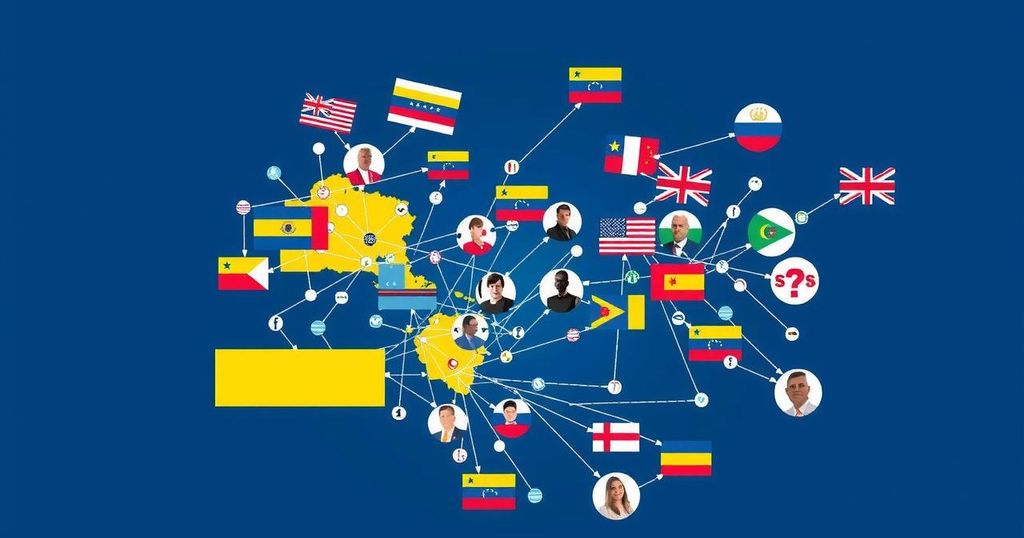Challenges to Electoral Legitimacy in Venezuela: A Call for Accountability

Venezuela faces a challenging political climate as opposition leaders contest Maduro’s election claims, prompting international recognition for Edmundo González. Protests demanding electoral integrity occur globally, with regional allies increasingly supporting the opposition. Despite past failures to unseat Maduro, a notable shift towards accountability emerges, underscoring the public’s desire for honesty in governance. Machado’s defiance signifies continued resistance against authoritarian rule.
The recent elections in Venezuela have sparked significant controversy and dissent, particularly against President Nicolás Maduro, whose legitimacy is being vigorously challenged. In August, as Maduro celebrated re-election, critics immediately alleged foul play, sharing polling results on social media that contradicted Maduro’s claims. This led to worldwide protests termed the “Great Protest for the Truth,” calling for electoral transparency and legitimacy.
In response to the outcry, the Biden administration has recognized Edmundo González Urrutia as the “president-elect” of Venezuela. Similarly, Colombian President Gustavo Petro dismissed the elections as a “mistake,” reaffirming the view that they were not free. These actions have been echoed by the European Parliament, which deemed González the legitimate president, supported by various international observer organizations, including The Carter Center.
Historically, this is not the first instance in which an opposition leader has claimed victory against Maduro’s regime. Five years prior, Juan Guaidó was recognized by numerous nations as interim president, although this did not result in a shift in power. Current dynamics, however, may indicate a potential change—regional allies of Venezuela are increasingly denouncing Maduro’s authority and insisting on the release of official voting results.
Additionally, a federal court in Argentina recently ordered the arrest of Maduro and his officials on charges of crimes against humanity. In Chile, President Gabriel Boric strongly criticized Venezuela’s Supreme Court for perpetuating electoral fraud. A blossoming movement among Latin American citizens is driving this shift, demonstrating a collective demand for governance rooted in honesty and equity.
According to David Recondo from the Center for International Studies at Science Po, “Latin America may be at a crossroads, with significant dissatisfaction directed towards corrupt elites.” He emphasized that the substantial voter turnout signals a public hunger for accountability and respect for democratic processes.
Despite international recognition, Mr. González’s path to power remains fraught with obstacles, given Maduro’s enduring support from allies like China, Russia, and Iran. Nevertheless, the context is shifting, as Maduro’s oppressive measures against dissent suggest that he is feeling the pressure of isolation. Moisés Naím, a prominent Venezuelan figure, remarked that “He desperately needs international recognition and legitimacy.”
The opposition, led by charismatic figures such as María Corina Machado, remains steadfast in its pursuit of democracy. Although banned from competing, Machado has rallied public support for González. Currently operating from a covert location, she asserts, “I am willing to do what has to be done for as long as it takes to assert the truth and popular sovereignty.” This determination reflects the larger struggle for democratic integrity within Venezuela and across Latin America.
The political landscape in Venezuela has been tumultuous, particularly under President Nicolás Maduro’s contested leadership. Allegations of electoral fraud have plagued his regime, culminating in widespread protests and international condemnation. The past instance of Juan Guaidó’s recognition as interim president showcases Venezuela’s ongoing struggle for democratic governance. The current political moment encapsulates a broader regional response to government corruption and inefficiency, with a collective yearning for transparency and accountability among Latin American populations.
In summary, the ongoing situation in Venezuela highlights a critical struggle for democratic integrity and human rights amidst allegations of corruption and electoral fraud. The recognition of opposition leader Edmundo González Urrutia by prominent governments signifies an important development; however, significant challenges still lie ahead for the Venezuelan people seeking to assert their sovereignty. Figures like María Corina Machado exemplify the resilience of the opposition, advocating for truth and justice in a landscape fraught with turmoil.
Original Source: www.csmonitor.com







